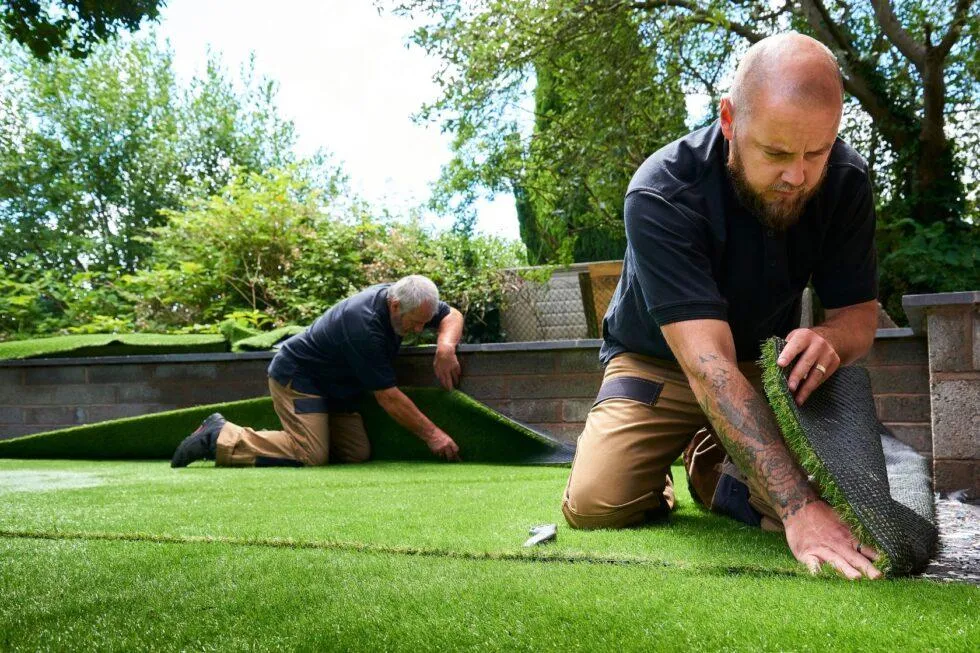Blog

The Role of 100% Recyclable Artificial Turf in Supporting LEED Certification Goals
As sustainability becomes a priority in the construction and design industry, the Leadership in Energy and Environmental Design (LEED) certification has emerged as a gold standard for evaluating and recognizing environmentally responsible building practices. LEED certification focuses on a building’s energy efficiency, water conservation, indoor environmental quality, and sustainable materials, among other factors. By incorporating sustainable solutions and products into design plans, property owners and developers can achieve higher levels of LEED certification, which can lead to various benefits such as increased property value, reduced operational costs, and positive environmental impact.
One such sustainable solution that can contribute significantly to green building practices and LEED certification is the use of 100% recyclable artificial turf from Tailor Made Grass. This innovative turf option provides numerous advantages that can support sustainability goals, improve site conditions, and contribute to a healthier environment for occupants. In this blog post, we will explore how incorporating our 100% recyclable artificial turf into residential and commercial projects can support LEED certification objectives and promote responsible building strategies.
In the following sections, we will delve deeper into the ways in which 100% recyclable artificial turf can contribute to LEED certification categories and their respective credits. By understanding the key role of this turf solution in sustainable construction and design, you can make informed decisions that support your project’s environmental objectives and the wider goal of creating a more sustainable built environment.
Sustainable Sites (SS) – Erosion Control and Landscape Management
One of the key aspects of LEED certification is the Sustainable Sites (SS) category, which focuses on reducing the negative environmental impact of construction and landscaping processes. Our 100% recyclable artificial turf can contribute positively to this category in several ways.
Firstly, the installation of a recyclable artificial turf system helps in controlling soil erosion by stabilizing the ground and creating a low-maintenance landscape. This is particularly beneficial in areas where erosion is a common issue due to sloping terrain, regular rainfall, or frost heave. By addressing erosion concerns, recyclable artificial turf supports the SS Prerequisite Construction Activity Pollution Prevention and the SS credit Site Development – Protect or Restore Habitat.
Moreover, since the 100% recyclable turf requires no water, fertilizers, or pesticides for maintenance, it eliminates the need for traditional landscape management practices that may contribute to stormwater runoff pollution. This can help projects achieve credits in the SS category related to stormwater management and site development.
Water Efficiency (WE) – Reducing Landscape Water Use
A significant portion of residential and commercial water use typically goes toward landscape irrigation. Installing 100% recyclable artificial turf can lead to tremendous water savings, directly contributing to the Water Efficiency (WE) category in the LEED certification process.
By design, our artificial turf systems are low-maintenance, eliminating the need for regular watering, which can be particularly advantageous in regions with limited water resources or drought-prone areas. Projects incorporating recyclable artificial turf may qualify for credits in the WE category for reducing landscape water use, specifically the WE credit Outdoor Water Use Reduction.
Further, artificial turf installations can contribute to water-efficient landscaping by reducing irrigation infrastructure requirements and providing permeable surfaces that aid in rainwater infiltration, contributing to the WE credit Rainwater Management.
Energy and Atmosphere (EA) – Improved Microclimate and Energy Savings
While the Energy and Atmosphere (EA) category in LEED certification primarily revolves around building design and energy use, the choice of landscaping materials can have an indirect effect on a building’s energy efficiency. Integrating artificial turf can result in improved microclimate conditions, which can help reduce the energy demand for heating and cooling.
Our 100% recyclable artificial turf can positively impact a site’s microclimate by moderating surface temperatures and reducing the “heat island effect” associated with traditional hardscape and paving materials. This can be particularly beneficial in urban settings, where reduced ambient temperatures can lead to lower cooling loads and energy savings. Projects that employ artificial turf for green roof installations or integrated landscaping elements may qualify for credits in the EA category, such as the EA credit Optimize Energy Performance and the EA credit Heat Island Reduction.
Materials and Resources (MR) – Responsible Sourcing and Waste Management
The Materials and Resources (MR) category in LEED certification is focused on the responsible sourcing of materials, reducing construction waste, and promoting long-lasting, durable products. By choosing our 100% recyclable artificial turf, projects can contribute positively to this category.
Recyclable turf offers a distinct advantage over conventional synthetic grass, ensuring that at the end of its lifecycle, the materials can be recycled and repurposed into new products. This feature reduces the amount of waste sent to landfills and supports the MR credit Building Product Disclosure and Optimization – Material Ingredients and the MR credit Construction and Demolition Waste Management.
Collaborating with Tailor Made Grass, a responsible manufacturer that prioritizes sustainability, can also qualify for credits related to responsible sourcing, such as the MR credit Building Product Disclosure and Optimization – Sourcing of Raw Materials.
Embarking on a Sustainable Path with Recyclable Artificial Turf
Incorporating 100% recyclable artificial turf from us into your project can offer numerous benefits that support LEED certification goals and encourage sustainable building practices. From erosion control and water conservation to improved microclimate conditions and responsible material usage, this innovative turf solution stands to make a significant impact on your project’s overall sustainability and adherence to LEED guidelines.
By understanding the role of recyclable artificial turf in the LEED certification categories and credits, you can make informed decisions that prioritize environmental responsibility and help elevate the quality of the built environment. If you’re ready to experience the benefits of a sustainable, high-performing turf solution that supports your LEED certification objectives, contact Tailor Made Grass today to learn more about how our 100% recyclable artificial turf in Georgia can transform your project into a beacon of sustainability.
It's Easy Being Green
Connect with us and schedule a FREE consultation today!

